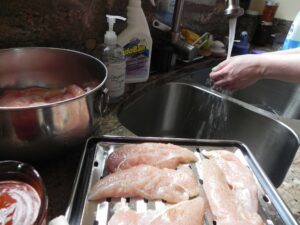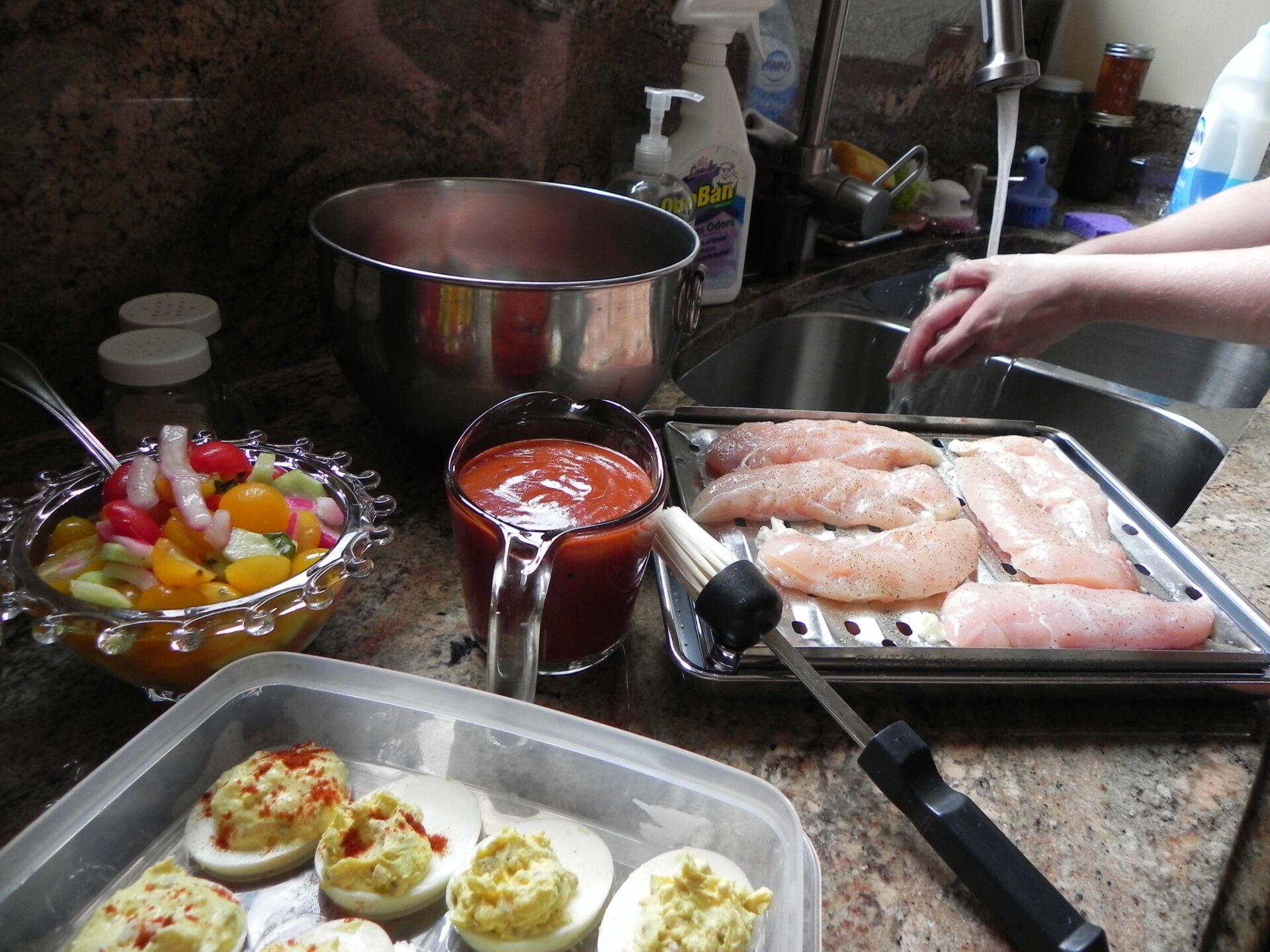CLEAN. SEPARATE. COOK. CHILL. These are the four rules for food safety.
At no time is food safety more of concern than at our annual national outdoor celebration of Independence Day. On the Fourth of July, most of us will be grilling, picnicking and watching fireworks displays. And despite the summer heat, we won’t be thinking about foodborne illnesses.
But we should.
 Foodborne illness is responsible for 1 of every 6 Americans getting sick each year, according to the Food Safety Education department of the U.S. Department of Agriculture. According to the department’s Luis Rivera, the actual number could be as much as 30 times higher, because mild cases often are considered a “bug” by the sufferer. The Centers for Disease Control and Prevention (CDC) estimate about 76 million people a year suffer from foodborne illnesses. (See www.foodsafety.gov )
Foodborne illness is responsible for 1 of every 6 Americans getting sick each year, according to the Food Safety Education department of the U.S. Department of Agriculture. According to the department’s Luis Rivera, the actual number could be as much as 30 times higher, because mild cases often are considered a “bug” by the sufferer. The Centers for Disease Control and Prevention (CDC) estimate about 76 million people a year suffer from foodborne illnesses. (See www.foodsafety.gov )
Most foodborne illnesses result from Salmonella infections, E. coli, and Listeria, norovirus, and to a lesser degree, parasites. Their incubation periods range from one to 70 days, and they usually cause gastrointestinal symptoms such as diarrhea, abdominal pain and vomiting, along with fever and body aches. Although most of these illnesses run their course, some can cause fatal secondary conditions such as kidney failure.
Avoid catching these foodborne illnesses by thoroughly washing hands with clean, running soapy water after each handling of pets, fresh produce, raw meats, or questionable materials. Keep utensils clean, and cook the foods completely.
Here’s a checklist of good practices for keeping your food safe.
FOOD SAFETY RULES FOR ALL SEASONS:
- Wash hands completely in soapy water for 20 seconds each time you handle raw produce, meats, or shellfish, and after gardening and handling pets.
- Thoroughly wash and dry all produce and fruits before cutting them to prevent the knife from spreading surface contamination.
- Soak raw sprouts and leafy greens in a solution of clean, cold, salty water or vinegar and water to remove most bacteria and parasites.
- Thaw food in fridge or in cold water, NEVER at room temperature.
- Cook cold-water-thawed foods immediately.
- Always marinate and set up dry-rubbed foods in the fridge, not at room temperature.
- ALWAYS keep uncooked meats separate from produce, cooked foods and ready-to-eat foods. Instruct the grocer to bag raw meats separately.
- Never place cooked food on the prep plate that held raw meat, poultry or seafood.
- Use separate cutting board for meats. Scrub thoroughly with bleach and soap after every use.
- Thoroughly cook meats, eggs, poultry. Avoid consuming raw or undercooked eggs, unpasteurized milk, or other unpasteurized dairy products.
- Use a clean thermometer each time you measure internal temps of meat, poultry, casseroles, and other foods.
- Allow leftovers to cool before storing them in the fridge or freezer because refrigerating hot foods will raise the surrounding appliance temperature to unsafe levels. Divide large quantities of leftovers into smaller amounts for quick cooling.
- Refrigerate or freeze perishables, prepped foods and leftovers — even baked potatoes — within 2 hours, or within 1 hour when temps reach high 90˚F or higher.
- Freezers should register 0˚F or below; fridge 40˚F or below.
- Always bring reheated sauces, soups and gravy to a boil to kill bacteria.
- Reheat other leftovers to at least 165˚F.
- “Safe” cooked temps are as follows:
- 145˚F for beef, pork, lamb, veal steaks, chops, and roasts. Allow to rest at least 3 minutes before carving or consuming to allow the heat to permeate entire piece of meat
- 160˚F for ground beef, pork, lamb and veal
- 160˚F for egg dishes/casseroles
- 165˚F for poultry. Cook poultry stuffing separately (not in cavity of the bird)
FOOD SAFETY RULES FOR PICNICKING AND GRILLING:
- Keep perishable foods in ice cooler
- Never place food in the sun
- Food should not sit out of the cooler above 90˚F for more than an hour
- Discard picnic leftovers that were not kept in the cooler
- Always completely clean the grill before placing fresh food on it
- Cook foods to proper internal temperature
- Always use clean grilling utensils, and do not comingle grilling utensils with those for dishing up finished foods
- Never re-use grilling marinades or sauces on cooked foods
- Always place cooked foods on clean plates/platters
- When in doubt about anticipated time to be spent outdoors, make up vinegar-marinated dishes instead of mayonnaise-based dishes.
Laurie Triplette is a writer, historian, and accredited appraiser of fine arts, dedicated to preserving Southern culture and foodways. Author of the award-winning community family cookbook GIMME SOME SUGAR, DARLIN’, and editor of ZEBRA TALES (Tailgating Recipes from the Ladies of the NFLRA), Triplette is a member of the Association of Food Journalists (AFJ),Southern Foodways Alliance (SFA) and the Southern Food and Beverage Museum (SOFAB). Check out the GIMME SOME SUGAR, DARLIN’ web site: www.tripleheartpress.com and follow Laurie’s food adventures on Facebook and Twitter (@LaurieTriplette).

